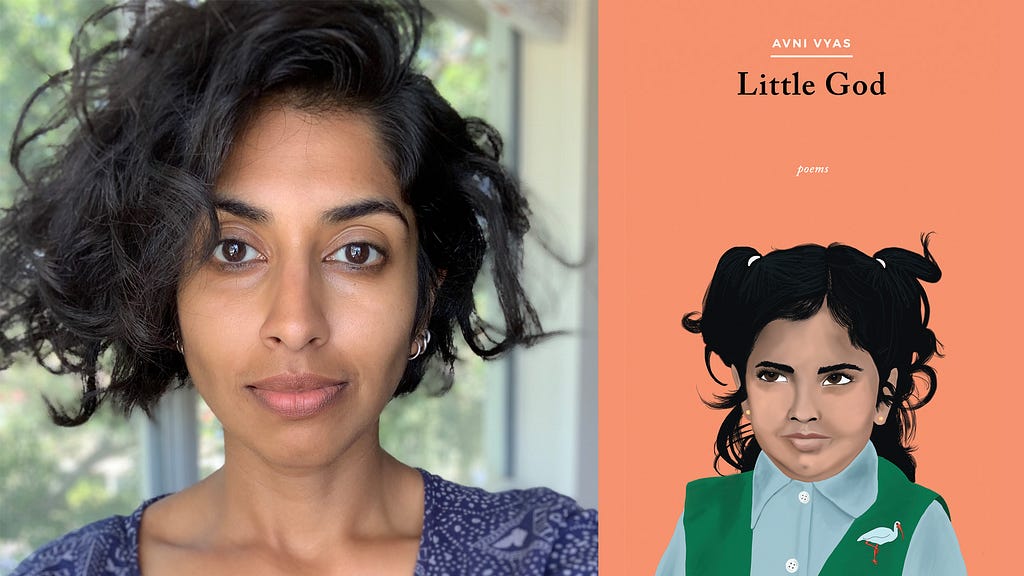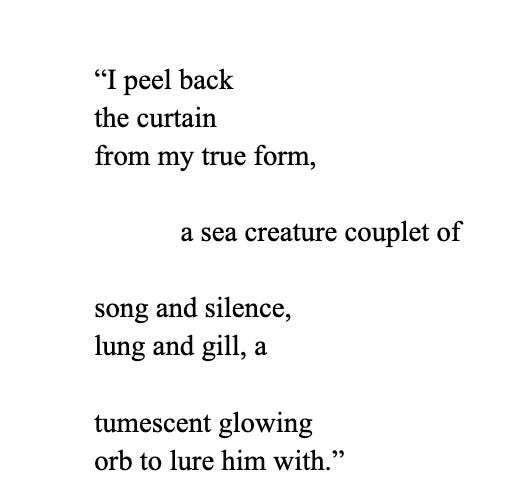Shadow Selves, Mirror Echoes, and the Bobtail Squid as Moonlight: A Review of Avni Vyas’s Little God
Little God by Avni Vyas
Burrow Press (October 26, 2021) — 83 pgs, $16.00
Content Warning: Mention of miscarriage.

“Imagine meeting the most forlorn, implacable version of yourself, and treating them like a deity,” Avni Vyas’s debut poetry collection opens with this delicious dare to her readers. It’s the leap she takes herself in writing this delightful collection with edges of sorrow and curlicues of whimsy. Little God is a riotous conversation between the self and its shadows, between life itself and its many almosts, between loss and rediscovery. The brevity of Vyas’s short lines call to mind Kay Ryan; her sharp wit and whimsical humor will remind readers of poets such as Chen Chen and Mary Oliver — in particular, we see Vyas, like Oliver, employ questions as the connective fabric of many of these dialogic poems. But, to be clear, this is a book unlike any other that I have read, with Vyas writing mesmerizing poems in an uncommon voice and vision.
Vyas begins with a note written directly to her readers. I was surprised by this direct address, immediately drawing me into conversation with the author. It is a brilliant approach because it immediately sets the deeply conversation tone for the book, an ongoing dialogue between the author and the “little god” who is a reference to Lord Krishna, described by Vyas as “part innocent life-force, part coddled brat.” Vyas draws upon her desi heritage to imagine this impish “child god” as her “writing partner.”
The introductory note to the reader establishes the poems that comprise the book — “Little God Speaks Dog;” “Little God Explains Dogs;” “Little God Explains Comedy;” “Little God Attends Community Beach Yoga;” “Little God Discovers Slang;” and “Little God Sings for the Unborn” — as “collaborative and conversational” by immediately making we readers collaborators in the conversation. Vyas is unapologetic in announcing who she is on the page and her unconventional direct approach to the reader, breaking the cardinal (and overused) rule of “show don’t tell” by telling the reader what her work will be about and how it will go about it, strikes me as a defiant way to craft a book. And it pays off, tremendously, in the pages that follow.
If Vyas’s note to the reader is direct and straightforward, then what follows is a series of bewildering loop-de-loops of fragments, conversations, echoes, and reflections. We learn in her introduction that the book deals with the aftermath of loss from miscarriage, but that it is ultimately not about the miscarriage: this sets up an intriguing framework of doubled selves and imagined realities, all within the Alice-in-Wonderland-esque conversations with the titular little god. “Today I love / the little god / who begets fragments,” Vyas writes in the first poem of the collection, “Little God Speaks Dog.” The act of fragmentation — of breaking the whole of self into many pieces — is at once the act of creating or “begetting.” It describes both the loss of miscarriage and the author’s choice to write these poems: to generate while simultaneously disintegrating, to create a whole of fragments.
Later in the poem, the little god asks, “Are you helping [. . .] the atoms unearth?” Again, we see this dance between fragments and wholeness — an atom is the smallest unit of matter that retains the properties of a given element and cannot be divided any further. For the atoms to “unearth” is to further undo the self: this term, “unearth,” is one of the many doubles of this collection. The common definition of “unearth” is to discover what has been hidden, but it could also be taken literally: to “un”- “earth” — to remove from earth or to become alien to itself. Either way, the atoms — these fragments of self — are disoriented and disorienting. The god asks the speaker if they are furthering this fracture of self and yet the god is itself a fracture of the speaker’s self, the id to the speaker’s ego. What a tightrope of self-reflection and what danger!
Danger, yes, because as we see in the next poem, “Little God Explains Dogs,” the journey into self-reflection is heavy with illusions in place of the discovery the speaker craves: “Like a red-shouldered hawk, the little god / divebombs puddle after puddle in the parking lot, / mistaking the reflection for a depth, a door.” The search for “a depth, a door” is instead a mere “reflection,” and yet Vyas, in setting up illusion versus reality here and elsewhere in Little God posits instead the concept of illusion as reality.
Later within the poem, we move from the altitudes of the red-shouldered hawk to the undersea waters of the bobtail squid. These creatures live in symbiosis with bioluminescent bacteria — yet another doubling between self and other-as-self within the collection — in shallow coastal waters, thus simultaneously in depth and at the periphery. The speaker describes how the bobtail squid “erase their moonshadows / from the sand floor,” and adds, “Imagine being mistaken for moonlight.” The little god counters this idea of illusion as unreality: “The god laughs / like dry hair in the winter. // Mistaken? / You poor thing.”
The doubled self, the shadowed self, the counter-illuminated self — in Little God, all these fragments of self are undiscarded and real. The bobtail squid’s camouflage imitating moonlight is no mistake — the illusion is an extension of itself. Vyas asks us as her readers to imagine our imagined selves as true, if not real, or at the very least undivided by a false binary between fact and fiction. These dualities are further examined in “Little God Attends Community Beach Yoga” as the speaker reflects on the self’s “true form”:

I love the defiance of that single line, spaced apart from the margins unlike the others, which ironically describes the self as a couplet — the self as a single line as a couplet: that seems to me what this entire collection aims to reflect.
As the speaker “peel[s] back / the curtain / from my true form,” it appears to recall the bobtail squid and its counter-illumined camouflage: a “tumescent glowing” that acts as a “lure.” In this case, the “him” could be the little god or a lover, as this poem elsewhere describes the gestures of a possible romance. What takes central importance, however, is the desire for the self as “song and silence, lung and gill,” to exist within contradiction and again, to be a true, if unreal, self.
Grief pushes the limits of imagination: we love what we can no longer see, what perhaps is no longer real. It fractures the self into uncountable selves: fragments of what exists in actuality and what exists in longing. This collection allows us to see the imagination of grief at work, in all its messiness and wonder, as shown most vividly later in this same poem:
“You broke into my house
while I slept.
And I looked like everyone you lost.”
It is clear that the speaker is at the left margin whereas the little god is speaking from the right margin, and while Vyas uses italics often to identify the little god’s voice, this section is distinct for the choice to separate the speech of the speaker and the little god at separate ends of the page. It physically illustrates the distance that grief’s imagination attempts to overcome.
As Vyas writes in the penultimate poem of the book, “Little God Discovers Slang,” “The god / pounds our heavy / strings because / he loves their echoes.” What is the love that persists in grief if not an echo? “Echoes,” of course, are themselves an echo of the many doubles within Little God and as we reach the end of the collection, we see perhaps the dyadic center of all these images: the self and what it loses / the self and what it becomes through loss. Becoming and loss — “the little god / who begets fragments” — exist in symbiosis, like the bobtail squid and its bioluminescent bacteria, for the voice of these poems. It is part of the promise of grief’s imagination: that we can face loss and yet, continue becoming.
Vyas takes us there in the final lines of the final poem, “Little God Sings for the Unborn”: “You wait for me in the bathroom mirror, / wearing our face on its silver surface, / until I say, ‘We become, my bird.’” The speaker is again in a space of self-reflection, the private intimacy of “the bathroom mirror” and the self, “our face,” is doubled. Here, it is unclear if she speaks to the little god or to loss — perhaps to both. What is clear is the transformation: “We become, my bird.”
That is the dream of this book — that we can love and lose and grieve, and then, become. These are poems of becoming, of self as shadows and as mirrors and as echoes, where god is little and the unreal is true. This is, in short, a stellar debut, one that asks you and your many selves to read and return to it often.
Shadow Selves, Mirror Echoes, and the Bobtail Squid as Moonlight: A Review of Avni Vyas’s Little… was originally published in ANMLY on Medium, where people are continuing the conversation by highlighting and responding to this story.
